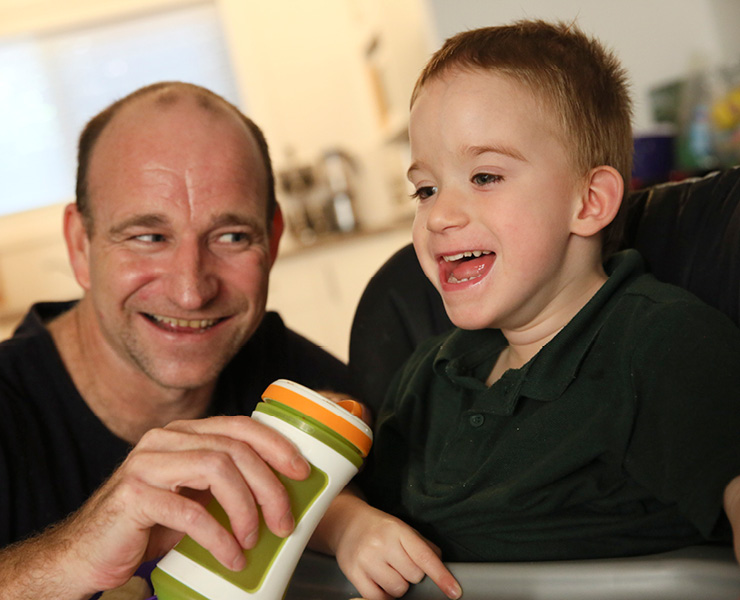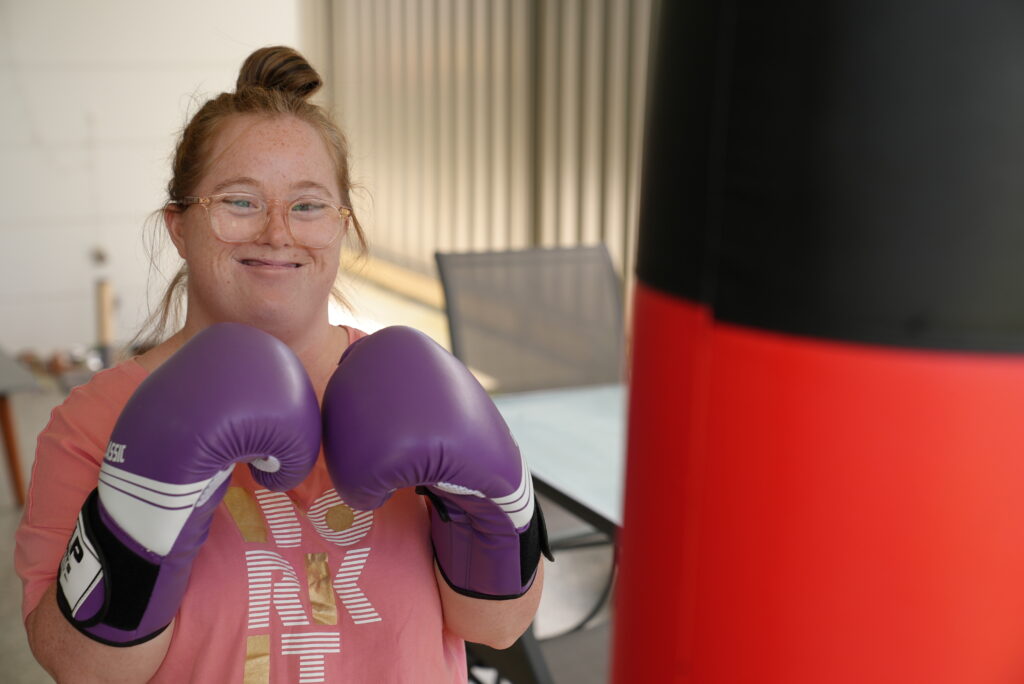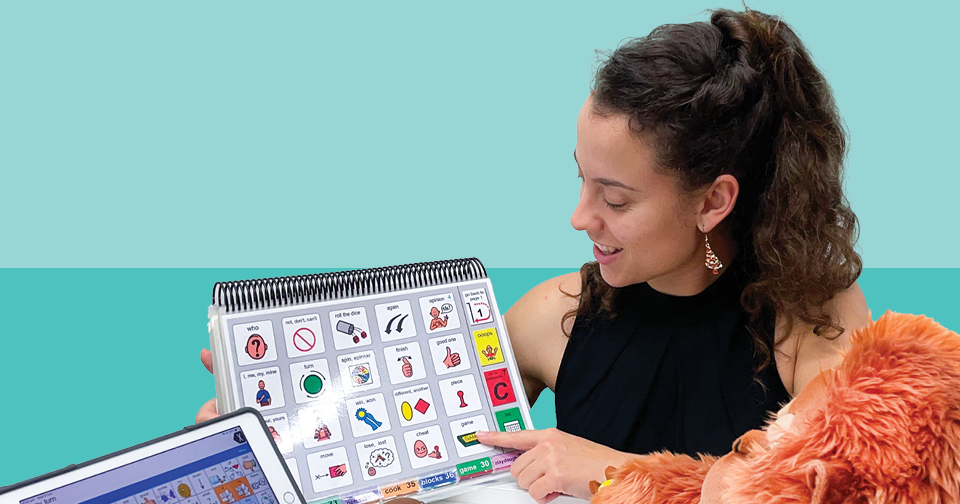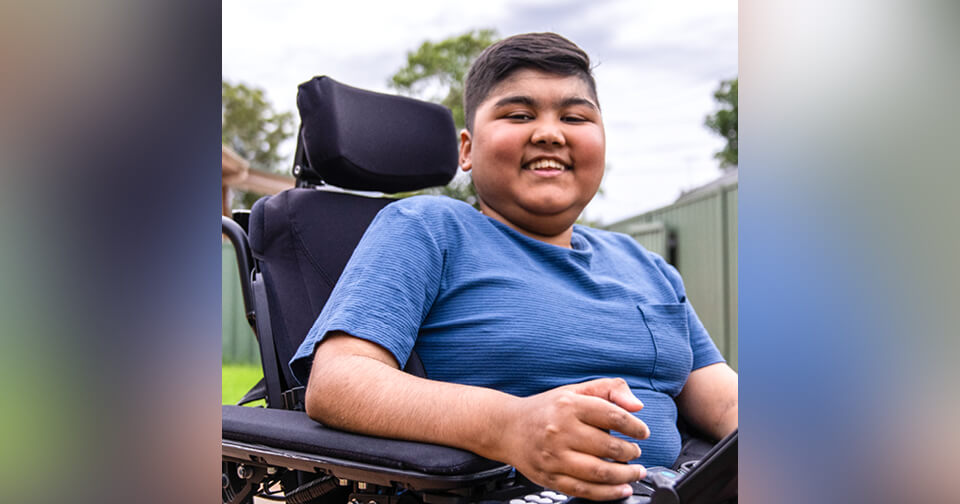Jan 12, 2024
NDIS Support for intellectual disabilities

People living with an intellectual disability may experience challenges with communication and some daily living activities. The Northcott team is here to help you navigate these, so that you can get on with living the life you choose. With the right supports, we believe you can live a great life! We have a range of supports for people at each stage of life and 90 years of experience in Queensland!
Intellectual disability is associated with:
- Fragile X syndrome
- Down syndrome
- Prader-Willi Syndrome (PWS)
- Fetal alcohol spectrum disorder (FASD)
- Angelman’s syndrome
- Other chromosomal disorders
- Environmental and unknown causes
Why Northcott?
Finding a suitable therapy provider for children and young people with an intellectual disability can be difficult. As a parent or a referrer, you want to ensure that the service provider has the knowledge and experience necessary to support you on your journey through key life transitions.
Northcott has a long history of working with people with intellectual disability. We have invested in the knowledge and skills of our therapists to ensure they are equipped to work with more complex cases.
Newly diagnosed with intellectual disability
An intellectual disability may be a specific diagnosis or associated with another condition. It is a lifelong condition that requires specialist support especially at times of change and transition. People with an intellectual disability may take longer to understand processes and information, memory can be affected and managing emotions can be tricky.
For any family, receiving a diagnosis is a challenging time as you seek to understand how to support your child and family. Northcott is here to help you navigate through the early days and to focus on early goals that can make a real difference in your child’s quality of life.
Our therapists work as part of a multidisciplinary team including Physiotherapists, Occupational Therapists, Speech Pathologists and Social Workers. This means that additional supports can be accessed quickly and easily.
What disability supports are available for intellectual disability?
Support to understand your diagnosis and what it means for your family
Northcott Social Workers have extensive experience working with families with intellectual disability. They can help you work through what your diagnosis will mean, connect you with the right supports and establish goals for early intervention.
Support with speech and language
In the first few years of life children go through significant language development. An intellectual disability can slow that development and be frustrating for both children and their parents. Speech Pathology support can help focus on alternative communication and speech and language goals.
Supporting parenting
Understandably parents can feel overwhelmed by a diagnosis. You may be unsure how to handle or interact with your child, even if you have other children. We understand this and Northcott therapists will work with your family to feel confident in interacting with your infant, engaging them with play and reading their cues.
Support with movement
Some people with intellectual disability will experience difficulties with movement or coordination. In the early years, Northcott Physiotherapists play a very important role in helping develop movement skills and supporting play.
Early Years support for intellectual disability
Children with an intellectual disability tend to learn and develop more slowly than other children of the same age.
Some children may have had delays in their development when they were young which may have been identified as a Global Developmental Delay. For other children, difficulties are only noticed when they start kindy or school and have trouble keeping up with the learning.
Identifying needs and accessing support as early as possible can be beneficial in supporting both the child and the family. Physiotherapists, Occupational Therapists, Speech Pathologists and Social Workers can all have an important role to play at this time.
Northcott supports for early years
Support with movement
Young children are going through significant growth in physical movement as well as speech and language development. Northcott therapy support at this critical time will focus on helping children move, play, learn and develop their potential.
Supporting communication, speech and language development
We will work with you to develop goals and strategies that assist in developing communication. This may include visual cues using pictures or symbols and could also involve Assistive Technology.
Getting ready for Learning
Kindy and Prep are important and exciting milestones in your child’s life. We want to ensure your child is well equipped to start learning. Your Northcott therapist can work with your teacher through meetings, education and training to help them understand your support needs in the classroom. Northcott also provides support at school through the Specialist Disability Support in Schools (SDSS) Program.
Assessments
Children with an intellectual disability may have periodic assessments. This can help with ensuring therapy focuses on achievable goals and may be important for NDIS or other funding applications. Assessments will consider the child’s strengths and challenges in communication, play, interaction, attention and listening, understanding/ using words and language, pronunciation, speaking and pre-literacy skills where appropriate. Schools will use assessments to gauge the appropriate level of support to provide.
Everyday life skills
Support can be provided for motor skills such as getting dressed, playing, and going to the toilet. This may involve learning individual steps first and then putting them together to achieve a task.
Support for school-aged children with intellectual disability
As children with an intellectual disability reach school age, their needs will change. This means their support needs to change with them.
Northcott therapists can help families understand what to expect and work collaboratively with other therapists to achieve age-appropriate goals. Therapy support at this age usually involves:
- Accessing home and community
- Starting and succeeding at school
- Maintaining independence with Assistive Technology and support.
Starting and succeeding at School
Starting school is a big milestone but it can also be overwhelming for many families as you navigate new environments, support in the classroom, extra-curricular activities and the emotional challenges that can emerge at school. Your Northcott therapist can support you to work through this and set you up for the best start at school.
Queensland schools are resourced to provide additional support for students with disabilities. Your therapist can help engage with your school to facilitate meeting your needs and suggest necessary accommodations.
Collaborating with school staff to set up goals and measure outcomes
Your Northcott therapist can work with your teacher through meetings, education and training to help them understand your support needs in the classroom. Northcott Queensland also provides support at school through the Specialist Disability Support in Schools (SDSS) Program.
Ongoing support with speech and language
As children get older, their communication needs become more complex – especially as they start school. Typically Northcott therapists will be supporting play, which remains a vital part of development at this age, as well as promoting independence to cope with school and other environments.
Building social networks
Sometimes our clients with an intellectual disability feel disconnected and socially isolated at school because of their disability. Our team can support communication strategies to help connect and communicate with peers. Having a group outside of school can also help build important social connections. We run social groups to bring people with similar experiences together.
Social Work support
Our social workers can support families with children experiencing anxiety or other challenges relating to their disability. They may be able to provide guidance on other organisations to provide support as well as more practical tips.
Support for older children and young adults with intellectual disability
Many parents are concerned about the next steps after school for their child with a disability. As with all times of transition, it can be an uncertain period as new support needs emerge and young people consider new goals as an adult. This can also be an exciting time to develop independence.
Therapy and other support at this age can be beneficial in building connections and participation in social, work or education including connecting with peers.
What support is there for older children and young adults with intellectual disability?
Continued support at school
Needs can change as students move through High School toward further education or the workplace. Support from Northcott therapists can assist you in keeping up with peers with both communication and physical movement needs.
Developing goals
Your Northcott therapist can help you develop and work on goals for post-school. This might be how to access further education, prepare for employment or develop life skills. Northcott also provides Support Coordination which can be particularly beneficial at times of change when new goals are identified for NDIS funding.
Supporting independence
As you grow older you might like to catch your own transport, move out of home, holiday independently from your family and pursue a job. The team at Northcott can help you develop new skills, overcome accessibility barriers and work with other organisations who may not be as aware of intellectual disabilities to get the support you need.
Developing new interests and hobbies
Once you leave school you may have more time for extra interests and hobbies. Hobbies are a great way to meet new people and learn new life skills. Our Lifestyle & Leisure group run day programs to help you be active, learn new skills and have fun.
Connecting with the community
Having a connection to your local community is important in feeling valued and contributing to society. Support is available from Northcott to connect and engage with new people.
Short and Medium Term Accommodation
Our Getaway on the Gold Coast provides Short and Medium Term Accommodation – with en-suite private rooms and 24 hour support. The team support short periods of respite, time away from home, supported holidays and longer stays following discharge from hospital. You can also stay with us while waiting for Supported Independent Living (SIL) or home adaptions to be completed.
Support for adults with an intellectual disability
Living with an intellectual disability as an adult will almost certainly require some ongoing support. This can include accommodation, communication, financial management and more. Goals may focus on developing independence as parents need to step back from their caring role. Northcott support can include Social Work advice to help a client with an intellectual disability live safely away from home. Communication and Assistive Technology needs can also continue to be addressed.
What support is there for adults with an intellectual disability?
Supporting independence
As you grow older you might like to catch your own transport, move out of home, holiday independently from your family and pursue a job. The team at Northcott can help you develop new skills, overcome accessibility barriers and work with other organisations who may not be as aware of intellectual disabilities to get the support you need. Where you are moving in to Supported Independent Living (SIL) Accommodation, we can help with training support workers to be able to support your individual needs.
Building social connections
Having a connection to your local community is important to feeling valued and contributing to society. Additional supports can be useful as you move from university to the workplace or into new accommodation in a different area.
Support Coordination
Northcott Support Coordinators can help adults with intellectual disability adjust the NDIS packages to suit new goals.



Accessibility and Inclusivity
We respect and honour Aboriginal and Torres Strait Islander Elders past, present and future. We acknowledge the stories, traditions and living cultures of Aboriginal and Torres Strait Islander peoples on this land and commit to building a brighter future together.
Read more about our commitment to reconciliation

